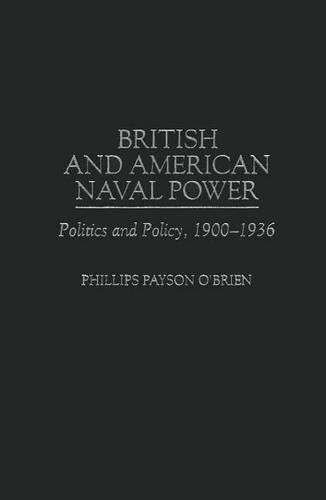
British and American Naval Power: Politics and Policy, 1900-1936
(Hardback)
Publishing Details
British and American Naval Power: Politics and Policy, 1900-1936
By (Author) Phillips O'Brien
Bloomsbury Publishing PLC
Praeger Publishers Inc
23rd April 1998
United States
Classifications
Tertiary Education
Non Fiction
Naval forces and warfare
Central / national / federal government policies
Military and defence strategy
359.00917130904
Physical Properties
Hardback
288
Width 156mm, Height 235mm
539g
Description
US and British naval power developed in quite different ways in the early 20th century before the Second World War. This study compares, contrasts and evaluates both British and American naval power as well as the politics that led to the development of each. Naval power was the single greatest manifestation of national power for both countries. Their armies were small and their air forces only existed for part of the period covered. For Great Britain, naval power was vital to her very existence, and for the US, naval power was far and away the most effective tool the country could use to exercise armed influence around the world. Therefore, the decisions made about the relative strengths of the two navies were in many ways the most important strategic choices the British and American governments ever made. An important book for military historians and those interested in the exercise and the extension of power.
Reviews
.,."O'Briens work is valuable on several counts. It succinctly adumbrates the differences between the two nations' political and popular perceptions of their respective navies and cogently summarizes Britain's streamlined and relatively efficient naval administration with the chaotic, factionalized, and uncoordinated U.S. Navy Department."-The Historian
"This important new book revisits some of the best known areas of modern naval history, providing fresh and rewarding insights....[T]his is an impressive book that will reward all students of twentieth century naval power."-The American Neptune
...O'Briens work is valuable on several counts. It succinctly adumbrates the differences between the two nations' political and popular perceptions of their respective navies and cogently summarizes Britain's streamlined and relatively efficient naval administration with the chaotic, factionalized, and uncoordinated U.S. Navy Department.-The Historian
O'Brien's rejection of rivalry over naval supremacy as the focal point of Anglo-US naval relations during the first half of the twentieth century is valid and a useful corrective to recent literature. His analysis of the shortcomings of Winston Churchill's naval chauvinism during the 1920s is persuasive.-The International History Review
The comparative focus makes this a valuable contribution to the historiography of both navies and to understanding defense policy during the first half of the 20th century.-Choice
This important new book revisits some of the best known areas of modern naval history, providing fresh and rewarding insights....[T]his is an impressive book that will reward all students of twentieth century naval power.-The American Neptune
"O'Brien's rejection of rivalry over naval supremacy as the focal point of Anglo-US naval relations during the first half of the twentieth century is valid and a useful corrective to recent literature. His analysis of the shortcomings of Winston Churchill's naval chauvinism during the 1920s is persuasive."-The International History Review
"The comparative focus makes this a valuable contribution to the historiography of both navies and to understanding defense policy during the first half of the 20th century."-Choice
..."O'Briens work is valuable on several counts. It succinctly adumbrates the differences between the two nations' political and popular perceptions of their respective navies and cogently summarizes Britain's streamlined and relatively efficient naval administration with the chaotic, factionalized, and uncoordinated U.S. Navy Department."-The Historian
Author Bio
PHILLIPS PAYSON O'BRIEN is a lecturer in Modern History at the University of Glasgow in Scotland. From 1991 until 1996 he was both the Mellon Research Fellow in American History at Cambridge University and a Drapers Research Fellow at Pembroke College, Cambridge.
